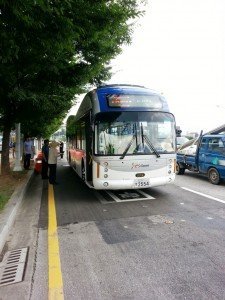Korea Constructs Road That Wirelessly Charges Moving Electric Buses

Researchers at Korea’s Advanced Institute of Science and Technology (KAIST) recently constructed a seven and a half mile stretch of asphalt roadway in the city of Gumi in South Korea with specialized electric cables designed to power batteries on a moving passenger bus.
The first of it’s kind technology doesn’t need the vehicles to stop at a point to charge.
The bus’s batteries are equipped with a novel technology called “Shaped Magnetic Field In Resonance” that sends electromagnetic fields created by the electric cables buried in the asphalt to the bus but not normal cars.
The technology recognizes vehicles capable of accepting the electric charge and those that cannot.
A coil in the battery can turn the electromagnetic fields into electricity at a distance of more than half a foot above the road.
Related News


